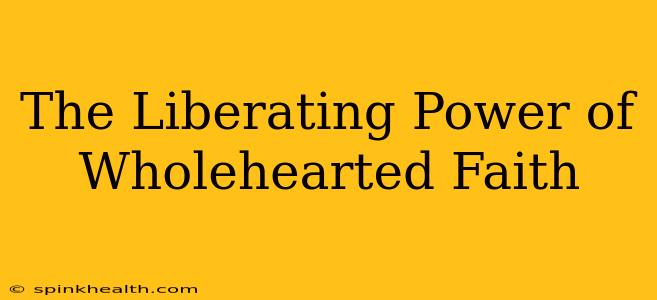Faith. The word itself evokes a range of emotions – comfort, hope, perhaps even doubt or fear. But at its core, wholehearted faith offers a profound liberation, a freedom from the anxieties and uncertainties that often grip us. It's not about blind adherence to dogma, but rather a deep, unwavering trust in something larger than ourselves. This trust empowers us to live more authentically, to embrace vulnerability, and to find joy even amidst life's inevitable challenges. This exploration delves into the transformative power of wholehearted faith, examining its multifaceted nature and the tangible benefits it offers.
What is Wholehearted Faith?
Wholehearted faith isn't merely a belief system; it's a way of being. It's about surrendering to a power greater than yourself, embracing your imperfections, and living with courageous authenticity. It's characterized by:
- Unwavering Trust: This goes beyond intellectual assent; it's a deep, visceral knowing that even in the face of adversity, you're not alone.
- Radical Acceptance: Embracing yourself completely, flaws and all, without judgment. This includes accepting both your triumphs and your failures as integral parts of your journey.
- Vulnerability: Allowing yourself to be seen, truly seen, with all your strengths and weaknesses. This requires courage, but it also fosters deeper connections with both yourself and others.
- Compassion: Extending kindness and empathy not only to others but also to yourself. Self-compassion is crucial for navigating life's inevitable setbacks.
- Courage: Facing your fears and stepping outside your comfort zone. Wholehearted faith empowers you to take risks, knowing that even if you stumble, you're supported.
How Does Wholehearted Faith Lead to Liberation?
The liberation offered by wholehearted faith is multifaceted. It manifests in various ways, including:
- Freedom from Fear: When you trust in a higher power, anxieties about the future lessen. You find peace in knowing that you're guided and protected, even when you can't see the path ahead.
- Emotional Freedom: Letting go of self-judgment and embracing vulnerability allows you to process emotions more effectively. You're no longer burdened by the need to present a perfect facade.
- Relational Freedom: Authenticity fosters deeper, more meaningful connections with others. When you're not afraid to be yourself, you attract people who appreciate and value you for who you truly are.
- Purpose-Driven Life: Faith often provides a sense of purpose and meaning, guiding you toward a life aligned with your values and passions. This sense of purpose can be incredibly liberating, giving your life direction and significance.
Is Wholehearted Faith Just for Religious People?
No. While often associated with religious beliefs, the principles of wholehearted faith can be applied regardless of your spiritual or religious background. It's about cultivating a deep sense of trust, acceptance, and compassion, qualities that benefit everyone. The "higher power" can be interpreted as nature, the universe, a guiding principle, or simply your inner wisdom. The core tenets remain applicable and beneficial across diverse belief systems.
How Can I Cultivate Wholehearted Faith?
Cultivating wholehearted faith is a journey, not a destination. It involves consistent effort and self-reflection. Here are some practices that can help:
- Mindfulness and Meditation: These practices help to quiet the mind and connect with your inner self.
- Journaling: Reflecting on your experiences and emotions can help you identify areas where you can cultivate greater self-acceptance and compassion.
- Acts of Service: Helping others is a powerful way to connect with something larger than yourself and cultivate compassion.
- Seeking Support: Connecting with like-minded individuals or a spiritual community can provide guidance and support on your journey.
What if I Struggle with Doubt?
Doubt is a natural part of the human experience. It doesn't negate your faith; rather, it can be an opportunity for growth and deeper understanding. Acknowledge your doubts, explore their origins, and engage in thoughtful reflection. Often, the act of grappling with doubt strengthens your faith in the long run.
Can Wholehearted Faith Help Me Overcome Trauma?
The healing power of wholehearted faith can be profound for those struggling with trauma. The unwavering trust, self-compassion, and sense of purpose it fosters can provide the strength and resilience needed to heal and move forward. However, it's important to remember that faith is not a replacement for professional help. Therapy and other forms of support are often necessary for effective trauma recovery.
In conclusion, wholehearted faith offers a path to liberation – a freedom from fear, self-doubt, and the limitations of a life lived inauthentically. It's a journey of self-discovery, embracing vulnerability, and trusting in something greater than oneself. Whether your faith is rooted in a religious tradition or a personal philosophy, the core principles of trust, acceptance, and compassion provide a powerful framework for living a more fulfilling and meaningful life.

